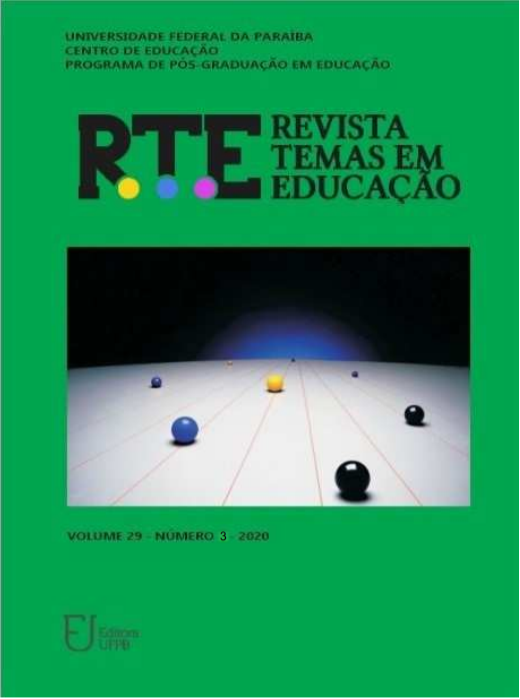BLACK WOMEN IN LITERATURE: THE WORD AS AN INSTRUMENT OF STRUGGLE AND RESISTANCE
BLACK WOMEN IN LITERATURE: THE WORD AS AN INSTRUMENT OF STRUGGLE AND RESISTANCE
DOI:
https://doi.org/10.22478/ufpb.2359-7003.2020v29n3.53133Keywords:
Black woman, Literature, Identity, ResistanceAbstract
This article aims to discuss how literature has been used as a mechanism of struggle and resistance by black women, in order to highlight different paths and themes that permeate such use. In this context, we propose a reflection on the voices that are present in literary writing from the place of speech of the writers, from their individual and collective experiences. Then, we carried out an analysis of how the authors, in their productions, approach issues related to identities, empowerment, struggles and resistance of black women. Historically, black women were placed outside the orders established by the patriarchal system, thus, the movement to give visibility to black women's literary texts is fundamental to deconstruct the dominant discourse and to recognize black female potentialities. Thus, the growth of contemporary black female authors in the literary sphere highlights the search for the “decolonization” of literature, using it as a means of identity existence and the search for equal rights. As a methodology for writing, we carry out bibliographic research, from different authors such as: Chimamanda Adichie (2009); Evaristo (2014); Davis (2016); Soares (2006) Osana Zolin (2009); Candido (2002); Facina (2004); Fences (2020); Ribeiro (2017); Zolin (2009); Guimarães (1998); Jesus (2000); Rufino (1988) and Santana (2015).
Downloads
References
CADERNOS NEGROS 25: poemas afro-brasileiros. (Org. Esmeralda Ribeiro e Márcio Barbosa). São Paulo: Quilombhoje, 2004, n.25. Disponível em: https://docobook.com/literatura-afro-brasileira-algumas-reflexoes-a.html Acesso em: 16 abr. 2020.
CANDIDO, Antonio. O direito à Literatura. In:______. Vários Escritos. São Paulo: Duas Cidades, 1988.
CANDIDO, Antonio. A literatura e a formação do homem. In: _____. Textos de intervenção. São Paulo: Duas Cidades/Ed. 34, 2002.
CARNEIRO, Sueli. Mulheres em movimento. Estudos Avançados, v. 17, n. 49, 2003.
CERCAS, Javier. A literatura cria gente livre. TAG – Experiências literárias, 2020. Disponível em: https://www.youtube.com/watch?v=9kWGZ4WlVVE Acesso em: 17 abr. 2020.
DAVIS, Angela. Mulheres, raça e classe. São Paulo: Boitempo, 2016.
EVARISTO, Conceição. Gênero e etnia: uma escre(vivência) de dupla face. In: MOREIRA, Nadilza Martins de Barros; SCHNEIDER, Liane (Org.). Mulheres no mundo. Etnia, marginalidade e diáspora. João Pessoa: Ed. Universitária; Ideia, 2005.
EVARISTO, Conceição. Becos da memória. Belo Horizonte: Mazza, 2006.
EVARISTO, Conceição. Da grafia-desenho de minha mãe um dos lugares de nascimento da minha escrita. In: ALEXANDRE, Marcos Antônio (Org.). Representações performáticas brasileiras: teorias, práticas e suas interfaces. Belo Horizonte: Mazza Edições, 2007.
EVARISTO, Conceição. Olhos d’água. Rio de Janeiro: Pallas: Fundação Biblioteca Nacional, 2014.
FACINA, Adriana. Literatura e sociedade. Rio de Janeiro: Jorge Zahar Ed., 2004.
GINZBURG, J. Literatura e direitos humanos: notas sobre um campo de debates. In: UMBACH, R. K. (Org.). Memórias da repressão. Santa Maria: UFSM/PPGL-Editores, 2008, p. 18.
GUIMARÃES, G. A cor da ternura. 12 ed. São Paulo: FTD, 1998.
JESUS, Carolina Maria de. Quarto de despejo. 8 ed. São Paulo: Ática, 2000.
RIBEIRO, Esmeralda. Ressurgir das cinzas. In: RIBEIRO; Esmeralda; BARBOSA, Marcio (Orgs.) Cadernos Negros. São Paulo: Quilombhoje, 2004, p. 63.
RIBEIRO, Matilde. (2008). Mulheres negras: uma trajetória de criatividade, determinação e organização. Revista Estudos Feministas, 16(3), 9871004. https://dx.doi.org/10.1590/S0104026X2008000300017
RIBEIRO, Djamila. O que é lugar de fala? Belo Horizonte (MG): Letramento; Justificando, 2017. (Feminismos Plurais)
RUFINO, Alzira. Eu, mulher negra, resisto. Santos: Edição da Autora, 1988.
SANTANA, Bianca. Quando me descobri negra. São Paulo: SESI-SP, 2015.
SANTANA, Bianca. Bianca Santana, a pesquisadora que busca romper o silenciamento das mulheres negras. HuffPost Brasil: 19 mar. 2018. Disponível em: https://www.huffpostbrasil.com/2018/03/19/bianca-santana-a-pesquisadora-que-busca-romper-o-silenciamento-das-mulheres-negras_a_23389499/ Acesso em: 16 abr. 2020.
SOARES, Cecilia C. Moreira. Mulher Negra na Bahia no Século XIX. Salvador, EDUNEB/Fundação Palmares, 2006.
SOBRAL, Cristiane. Só por hoje vou deixar meu cabelo em paz. Taguatinga, DF: Ed. Teixeira, 2014.
ZOLIN, L. O. Literatura de Autoria Feminina. In: BONNICI, Thomas e ZOLIN, Lúcia Osana (Org.) Teoria Literária: Abordagens Históricas e Tendências Contemporâneas. 3ª ed. Maringá: Eduem, 2009.
Downloads
Published
How to Cite
Issue
Section
License
Authors who publish in this journal agree to the following terms:
. Authors retain the copyright and grant the journal the right to first publication, with the work simultaneously licensed under the Licença Creative Commons Attribution that allows the sharing of the work with acknowledgment of authorship and initial publication in this magazine. . Authors are authorized to assume additional contracts separately, for non-exclusive distribution of the version of the work published in this journal (eg, publishing in institutional repository or as a book chapter), with acknowledgment of authorship and initial publication in this journal.
. Authors are permitted and encouraged to publish and distribute their work online (eg in institutional repositories or on their personal page) at any point before or during the editorial process, as this can generate productive changes, as well as increase impact and citation of the published work (See O Efeito do Acesso Livre).



















